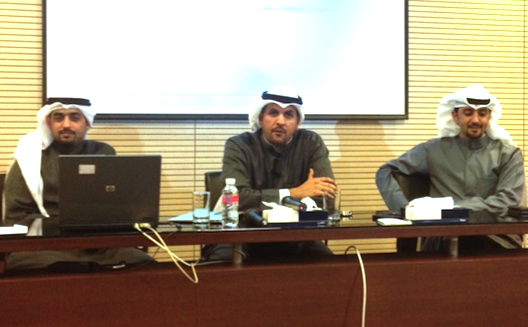8 Tips for Building a Successful Company, from the 5th Startup Q8


Our fifth monthly Startup Q8 (Kuwait) event may have been our very best.
We had two sessions:
- Designing Customer Experience by Haider Al-Mosawi
- An interview and open discussion with the co-founders of AlMowazi.com, an online secondary market for unlisted equity shares.
I started with a short brief about StartupQ8 and why it exists, and then Haider Al-Mosawi began his session on designing your customer experiences. Here are some of his major conclusions:
- Prioritize and focus on the customer
experience. How people feel about your company and dealing
with you is important, because their feelings determine their
consumer behavior.
- Empathize with your customers. See your
business from their point of view, understand their needs, and take
when designing their interaction with you.
- Think of your company as a person. What
personality does it have? Does it make others want to deal with it?
What reputation does it have? Is it generous or greedy? Caring or
careless?
- Track referrals and repeat purchases. These are both good indicators that you're pleasing your existing customers; aim to increase these two metrics.
During the Q&A, Ali AlNusuf, a former entrepreneur and
co-founder of asked whether it was critical to go through this
experience right away. “The Lean Startup and other new
methodologies push you to deliver a product that barely works, in
order to test and validate your assumptions. Why should an
entrepreneur spend his or her resources on marketing and customer
service when he is not sure yet if his product and business model
works?” he asked.
“If you are really solving a problem, then the customer will jump
in and use your product even if the customer experience is not that
good. Actually that’s a great indication that you are into
something big,” he pointed out.
To see Al-Mosawi’s response, watch the full video:
In the second half, we interviewed the Almowazi.com team. Almowazi is an online secondary market, which works like a stock exchange market, but for unlisted equity shares, similar to the famous startup SecondMarket.com.
People loved this session because the four co-founders (Mohannad AlSane, Basel AlJarallah, Khaled AlSayer and Ahmed AlReshaid) were so open and gave honest answers regarding some sensitive issues. At prior Startup Q8s, founders have avoided sensitive questions, so this was a refreshing moment.
Launched in 2007, Almowazi enjoyed healthy traffic and trading until the financial crisis hit shortly afterwards. After that, the startup struggled to generate revenue by taking a commission on transactions, as trading completely stopped during the crisis. Below are the main takeaways from our interview:
- Be transparent. Almozawi recommended that all
companies listed on Almowazi be transparent with their information.
That philosophy led to their becoming the primary source for news
related to non-listed companies in Kuwait; even during the crisis,
they said. Now, even the Central Bank in Kuwait uses our platform
to find information. This traffic has allowed the startup to
monetize through new channels, such as advertisement.
- Know your market. Each of the co-founders had
a background in the financial sector, so they felt and understood
the issues surrounding trading very well and knew what it would
take to build a secondary market.
- Be first. While being the first mover doesn’t
always offer an advantage, here it gave Almozawi a substantial
advantage over the competitors that quickly followed. The
Startup Genome report speaks to this advantage for marketplace
startups (i.e. online platforms that connect sellers with buyers):
“Winner takes all.”
- Be committed. Although each of the founders maintained his day job, working part time in the company didn’t stop them from building a good and disruptive startup.


